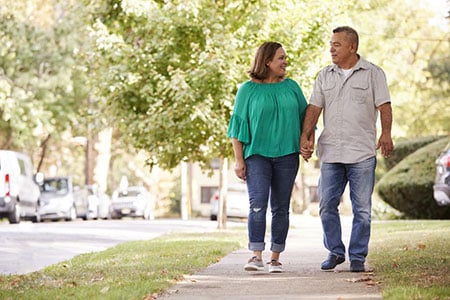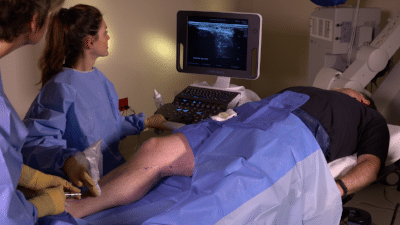Common Symptoms of CVI – Should you be concerned?

The concern about having or developing Chronic Venous Insufficiency (CVI) is a great reason to have your varicose veins fully assessed by a qualified Vein Specialist.
Why should I be concerned about the symptoms of Chronic Veins Insufficiency?
Chronic Venous Insufficiency, also known as Venous Reflux Disease or Venous Stasis, refers to a condition of inadequate blood flow from the legs back to the heart. In healthy veins, blood pressure and muscle movement move blood out of the legs and upwards; one-way valves prevent back-flow of blood between heart beats. When those valves become weak, veins become distended and blood pools in the lower legs. This can lead to Chronic Venous Insufficiency. While CVI is not usually lethal, its symptoms can significantly diminish your quality of life.
What are the most common symptoms of Chronic Venous Insufficiency?
If you experience any of these symptoms, consider getting a full vascular health evaluation from a qualified Vein Specialist to determine what can be done to improve your quality of life.
- Varicose and spider veins
- Swelling of the legs and ankles
- Skin color changes over the legs and ankles
- Sores on the legs (ulcers), especially those that are slow to heal
- Aching legs
- Heavy legs
- Burning, throbbing in the legs
- Muscle cramps
- Leg fatigue
- Bleeding veins
- Itching over veins
- Restless legs
- Leg pain after sitting or standing long periods
Who is at risk of developing the symptoms of Chronic Venous Insufficiency?
There are a number of reasons that venous valves become weaker, and family history tops the list. If other members of your family have CVI, you have a much higher chance of developing this condition. Other factors include:
- Age. Vessel walls get weaker over time.
- Hormonal factors. Hormonal imbalances and fluctuations affect vessel wall integrity.
- Pregnancy. Hormonal fluctuations and the physical pressures of pregnancy are both factors.
- Trauma and other injury to the legs. Scar tissue can also impair blood flow.
- Deep Vein Thrombosis. These are clots that form in the deep venous system and impede blood flow.
There are lifestyle factors, as well, that can increase your chances of developing CVI. Any repeated activity (or inactivity) that impedes or slows blood movement in the body will impair your vascular health, including:
- Standing or sitting for long periods. Gravity can take a toll, and blood moves better when the body is moving.
- Obesity. It takes a lot of physical resources to support increased fat tissue.
- Smoking. Not only does smoking decrease the amount of oxygen that is taken in by the body, its long-term effects include a buildup of plaque and decreased flexibility in the vessel walls.
- Hypertension. High blood pressure can also contribute to a decrease in blood vessel wall flexibility.
- Lack of physical activity. Blood moves better when the body is moving.
Treatment for the symptoms
While there is no cure, there are a number of minimally invasive procedures available that will improve vascular sufficiency, and provide relief from CVI symptoms. Read more about them by clicking on the links.
- Medical Adhesive (Veneseal Closure System)
- Laser Treatment (Endovenous Laser Treatment (EVLT)
- Radio Frequency Ablation (ClosureFast Radiofrequency Procedure)
- Liquid Sclerotherapy and Compression (chemical injection)
A board certified Vein Specialist can provide you with a full vascular exam and Duplex Ultrasound.These tools will measure the blood flow returning to the heart, assess your overall vein health, and allow for the creation of a treatment plan tailored to your specific needs.
Question: I am 50 years old; a bachelor, and a teacher. Right now I have varicose veins (though they are not painful) in my right leg. I am not happy to see them. What can you suggest to lessen its visibility? Answer: Unfortunately, most conservative therapies are designed for symptomatic control and not necessarily appearance. Treatments…
Read MorePregunta: me lastimé el pie ayer a medio camino hacia los dedos de los pies. Tengo que volar en dos días. ¿Debo usar calcetines de vuelo? Mi pie está ligeramente hinchado. He estado descansando con el pie hacia arriba. Puedo caminar sobre ella. Duele un poco. El vuelo dura 7 horas.
Read MorePregunta: tengo trombosis venosa profunda (TVP) en mi pantorrilla derecha, sólo han pasado 3 semanas desde que me enteré. Mi pierna todavía se hincha después de 3 semanas, incluso cuando llevo mi media de compresión 20 -30. Es normal. ¿Debo quitarlo y elevar mi pierna o dejarla encendida?
Read MoreQuestion: I hurt my foot yesterday halfway towards the toes. I have to fly in 2 days. Should I wear flight socks? My foot is slightly swollen. I've been resting with the foot up. I can walk on it. It hurts a little bit. The flight is 7 hours long.
Read MoreQuestion: I have deep vein thrombosis (DVT) in my right calf, it has only been 3 weeks since I found out. My leg still swells after 3 weeks even when I wear my compression stocking 20 -30. Is this normal. Should I be take it off and elevate my leg or leave it on?
Read MorePregunta: Quiero saber que ejercicios funcionan mejor ya que mi tratamiento EVLT no me dio los buenos resultados que me esperaba.
Read MoreQuestion: I want to know which exercises work best since my EVLT treatment did not get me the good results that I expected. Answer: Ones ability to exercise, and the types of exercise a person can complete, varies greatly. Speaking in generalities, exercise that benefits lower extremity venous health does not have to be significantly…
Read MoreLa cirugía de la vena varicosa no es lo que solía ser Si usted ha escuchado — o experimentado — historias sobre la cirugía de eliminación de venas estándar que ocurrieron antes de la vuelta de este siglo, es comprensible si usted está preocupado acerca de la búsqueda de ayuda de un especialista en venas…
Read MoreVaricose vein surgery not what it used to be If you have heard-or experienced–stories about standard vein removal surgery that happened prior to the turn of this century, it is understandable if you are concerned about seeking help from a qualified vein specialist for your painful varicose veins. There was a time when leg vein…
Read MoreCalambres en las piernas Hay muchas razones para los calambres musculares. Mucha gente los experimenta debido a una deficiencia de ciertos elementos clave como el potasio y el magnesio. Otros, particularmente aquellos que viven en climas más cálidos como Arizona, experimentan calambres debido a la deshidratación. UN gran número de pacientes a los que consulto,…
Read More

